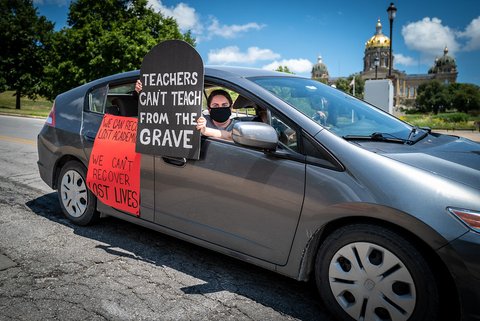
03 Feb Contra Costa School Boards Want Teachers to Get COVID-19 Vaccine Priority

School officials say teachers should get priority access to the COVID-19 vaccine because they are high risk and because it would help in-person instruction return. Here, teachers on July 24, 2020, protested plans to reopen schools in Iowa. (“Iowa Teachers Drive for Lives” by Phil Roeder, licensed under CC BY 2.0.)
By Edward Booth
The Contra Costa County School Boards Association and 14 school board presidents sent a joint letter Monday calling on the Contra Costa Board of Supervisors and the county health department to give local education workers priority access to the COVID-19 vaccine.
The letter also calls on the county to communicate clearly how those vaccines will be given to education workers. The letter was sent within the storm of an ongoing debate of whether, when and how to reopen school campuses for in-person learning that’s been occurring throughout the United States.
“Federal, State, and local municipalities have emphasized how critical safe, open schools are to the economy and to public health,” says the letter. “In the depth of this global pandemic these claims regarding the health and safety of our school communities must be met by action. Prioritizing education workers for vaccination distribution will greatly help school districts to finalize return to school plans.”
Vaccinating education workers will ensure the health and safety of teachers and staff, according to the letter, which would help school districts complete plans for a return to in-person learning. The letter notes school employees’ role in potential COVID-19 transmission networks, as they’re linked thorough students and colleagues to hundreds of families. Because of this, they’re at risk of infection and transmission.
The letter goes on to say that even in school districts that are entirely using distance learning, school staff continue to assist students and families by distributing books and supplies, troubleshooting technology, helping newcomer families and preparing food. School employees are essential, the letter says, meaning their work cannot be done remotely.
“Vaccinating school employees immediately will greatly help our public schools continue to provide distance learning, provide crucial community support, and safely reopen or keep open our schools,” reads the letter.
Mister Phillips, board president of the West Contra Costa Board of Education and a signer of the letter, asked county health officer Dr. Chris Farnitano in a public comment at a board of supervisors meeting Tuesday how much flexibility there is in state vaccine guidelines to make decisions best suited for individual counties. Other counties, he said, had started vaccinating school employees because they understood that school employees are essential workers.
Phillips said if the county wants to move back to a sense of normalcy, it has to make sure schools are part of that move. Otherwise, he said, the county will continue to not be able to meet the needs of the entire community because it removed schools, an essential service, from the equation.
Cherise Khanud, president of the county school board association, also said in a public comment that the county needed to remember schools are community hubs.
“I think if we use these hubs and first vaccinate all our school employees who are already providing community services to families we can then more easily move into vaccinating our families in the area,” Khanud said.
Farnitano responded, at the request of county supervisor John Gioia, and said there initially was more flexibility in how vaccines could be assigned, but the state’s been more rigid recently in how vaccines can be given to which populations. Farnitano said the county does have a COVID-19 vaccine equitable and ethical allocation committee that meets several times a week, with representatives from the health department, faith communities, farmworkers, teachers and hard-hit communities.
“There are no easy decisions, there are no good choices here,” Farnitano said. “It’s really going between a series of less bad choices. Seniors are important to vaccinate, teachers are important to vaccinate, farmworkers, restaurant workers, grocery store workers. Prioritizing our hardest hit communities is really important, the people under 65 with health conditions that put them at higher risk, the folks with disabilities that put them at higher risk, the family members of people at risk, the caregivers of people at risk, other essential workers, homeless individuals.”
Farnitano continued, saying the issue is supply, and not whether groups deserve priority.
“Everyone has a really strong case why they should be vaccinated soon,” he said. “And everyone should be vaccinated soon. And we would vaccinate everyone soon if we had enough vaccines.”






No Comments